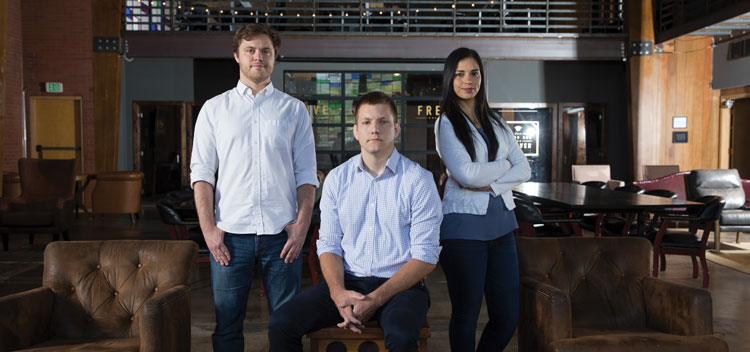By Jason Tashea

Sam Stoddard, Brady Stoddard and Aydé Soto.
Photo by Benjamin Hager/ABA Journal
Two of the three founding members of the immigration software company SimpleCitizen have gone through the U.S. immigration process after getting married, and both were left wanting by their legal counsel.
“Sometimes attorneys aren’t the best at customer service or user experience,” says Aydé Soto, 34, chief technology officer at SimpleCitizen, who immigrated from Mexico to the U.S. five years ago.
CEO Sam Stoddard, 33, had a similar experience when helping his wife, who is from South Korea, immigrate to the U.S.
A student at Brigham Young University at the time, he sought help from an attorney who ran informational sessions for students. He says the lawyer took a condescending tone and used the meetings as a chance to upsell her services.
With this backdrop, and the help of chief marketing officer Brady Stoddard—30 and Sam Stoddard’s nephew—SimpleCitizen was born in 2015. Based in Utah, the company isn’t a vendetta against attorneys. Rather, it helps immigrants and their families navigate a costly and confusing system in an inexpensive and efficient way.
The program is, as the name indicates, pretty simple: A user logs on to the site and fills in relevant information about the applicant. Once the data collection is complete, the reams of forms are automatically populated. This service costs $249. For an extra $99, an attorney will review the application.
Being consumer-facing wasn’t always the plan. In the beginning, the Stoddards thought they’d build a tool for lawyers. However, when they reached out to immigration firms across Utah to solicit feedback, they didn’t receive a single response.
So they chose the “path of least resistance,” says Sam Stoddard, and made a platform for consumers needing help with green card and citizenship applications. Claudia Soto—no relation to Aydé Soto—used the product to immigrate to the U.S. from Costa Rica.
“When I saw my application printed out—after I filled in all the information and I uploaded supporting documents—I was in shock,” she says. “I was so thankful I didn’t have to fill out every single line.”
Expanding its reach, the team is working closely with legal departments and paralegals to create a platform that will be able to help with inbound and outbound immigration issues faced by corporate America. The program came out of SimpleCitizen’s time at the prestigious Bay Area accelerator Y Combinator and is currently in beta.
SimpleCitizen was launched just before the 2016 election and has existed in an acrimonious time for immigration issues and immigrants themselves. Despite the political environment, the company has received significant support from their deep-red home state.
Through the Utah Governor’s Office of Economic Development, the company was awarded a $100,000 grant to help commercialize its product shortly after launch.
“Our leaders—from the governor to our federal delegation and down to our mayors and state reps—know the value of what SimpleCitizen accomplishes through their platform and how it lines up with Utah values,” says Clark Cahoon, director of the life science cluster at the Governor’s Office of Economic Development. “A more simple immigration process is a win for Utah and the nation as a whole.”